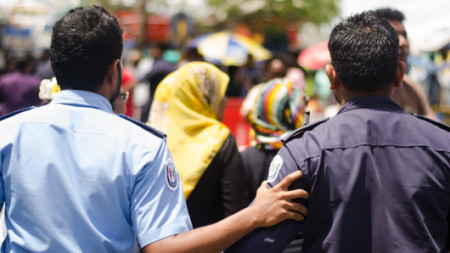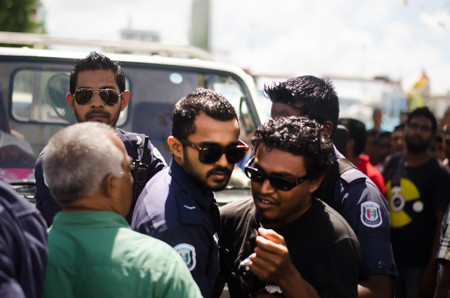Former President Mohamed Nasheed will be incarcerated in a 264-square foot furnished “prison apartment” in Maafushi jail with air-conditioning, a sitting room, a television and VCD player, Home Minister Umar Naseer has said.
Naseer revealed in a tweet this morning that the opposition leader would also have a 1,087-square foot garden and would be able to “live with other inmate-friends.”
MNasheed’s 264sqft Prison apartment: 1room, sittingroom, furnished, AC, TV, VCD player. Garden 1087sqft. Live with other inmate-friends.
— Umar Naseer (@UmarNaseerPPM) March 16, 2015
“The government guarantees the safety, welfare, and protection of former [President] Nasheed while in custody,” Naseer tweeted last night.
“He’ll be treated with respect and dignity.”
Following the Criminal Court sentencing Nasheed to 13 years in jail on Friday night, Naseer said he had asked police to hold the former president in Dhoonidhoo detention centre “until a special unit is constructed in Maafushi prison.”
Nasheed was found guilty on terrorism charges over the January 2012 military detention of Criminal Court Chief Judge Abdulla Mohamed.
However, the office of former President Nasheed released a statement today claiming the cell being prepared to house the opposition leader was in an area of the jail deemed unfit for human habitation.
“The use of the cell being prepared in Maafushi jail was discontinued after the Human Rights Commission of Maldives and the International Red Cross and Red Crescent determined in 2009 that it was unfit to hold people,” the statement read.
“The toilet of the cell currently being prepared is inside the cell. It was built such that unclean odours and bacteria fans out to the whole cell. It is adjacent to the jail’s garbage dump. Germs, bacteria and unclean air constantly circulate inside the cell.”
The Maldives Correctional Services – which manages jails and detention centres – functions under the home ministry.
Home Ministry Media Coordinator Thazmeel Abdul Samad told Minivan News today that he was not aware of the location of the cell within the jail.
“It is being built in the most appropriate way to hold a former president of Maldives,” he insisted, adding that Nasheed would “not feel any discomfort.”
Thazmeel said construction of the cell would be complete within a week or ten days.
The office of the former president meanwhile contended that the the home ministry’s arrangements were in violation of the Constitution as well as the Maldives’ obligations under the the International Convention on Civil and Political Rights and the Convention against Torture and other Cruel, Inhumane or Degrading Treatment or Punishment.
“This government is making arrangements to unjustly cause serious harm to President Nasheed,” the statement alleged, adding that preventing inmates from interacting with others or from being seen by anyone was also against the domestic anti-torture law.
“We have received information of the Ministry of Home Affairs preparing a good place to hold President Nasheed and making arrangements to keep other inmates with him,” it continued.
“However, the cell is being prepared in an area in Maafushi jail that has been deemed unfit for human habitation. And as the other inmates to be kept with President Nasheed so as not to keep him in isolation would be determined by this government, we are extremely concerned over the threat to President Nasheed’s safety and security.”
Related to this story
Former President Nasheed found guilty of terrorism, sentenced to 13 years in prison
Government will ensure Nasheed’s right to appeal conviction, says spokesperson
Respect Criminal Court verdict, says President Yameen
“This is not a court of law. This is injustice,” Nasheed tells the Criminal Court
MDP to launch national civil disobedience campaign to free Nasheed



